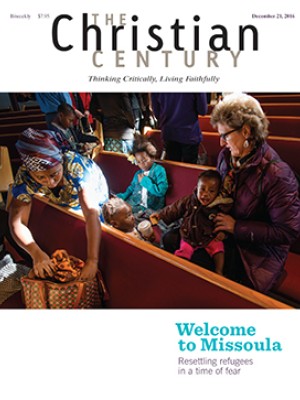The rise and fall—and rise?—of Christian nationalism
Did the 2016 election portend the rise of Christian nationalism?
Only two years ago, the percentage of Americans who identified being a Christian with being an American had dropped precipitously from its post-September 11 hike.
Just one-third of Americans in 2014 said being Christian was very important to being a “true American.” That was down from the nearly half of Americans who felt that way in 2004, the General Social Survey found.
Two new studies shed light on the conditions that predict support for Christian nationalism and on how Donald Trump’s presidential run may have played a substantial role in its revival.
It didn’t matter if the fears articulated by Trump were real, said Clemson University researcher Andrew Whitehead, lead investigator in one study.
“Whether there was really a threat . . . he was trying to say there was a threat,” Whitehead said. “A certain section of America felt it really resonated.”
What is real are the consequences of defining America as a Christian nation, Whitehead said.
It can matter, Whitehead noted, in determining “who gets what, who is a part of, and who can take part” in American life.
The United States from its founding has dealt with the tension of seeing itself both as having a special covenantal relationship with God and as a home for the free exercise of religion.
For example, Trump’s rhetoric attacking Muslims and immigrants, and even proposing a religious test for immigration, has parallels in the 19th-century nativist movement deriding Catholic immigrants as a threat to the American way of life.
In their study, Whitehead and researcher Christopher Scheitle of West Virginia University analyzed more than 3,000 responses to questions on the qualities of being an American and of patriotism from the 1996, 2004, and 2014 General Social Surveys.
They presented their findings at the recent joint annual meeting of the Society for the Scientific Study of Religion and the Religious Research Association in Atlanta.
The ties between religion and nationalism can change dramatically in different time periods:
- In 1996, some 38 percent of respondents said being a Christian was very important to being an American.
- In 2004 nearly half, or 48 percent, of Americans, attributed the same significance to being a Christian.
- In 2014, a period of relative calm, the percentage dropped to one-third.
The importance of other markers of being American—being able to speak English and being born in the United States—also rose from 1996 to 2004, but reverted back to 1996 levels in 2014.
Read our latest issue or browse back issues.
In a separate study, researchers examining varieties of American popular nationalism with data from the 2004 General Social Survey found that individuals who believed being a Christian was very important to being a true American were more likely to be what they termed ardent or restrictive nationalists. Respondents in both of those groups also were more likely to say immigrants increase crime rates and take jobs from Americans.
“Disagreement about the importance of Christianity as a criterion of national membership is a central axis of division,” researchers from Harvard University and New York University reported in the current issue of the American Sociological Review.
So how did we go from the relative trust of 2014 to having a substantial part of the electorate receptive to anti-immigrant and anti-Islam appeals in 2016?
Fear appears to be one major reason. This could be attributed in part to recent terrorist events, such as the bombings in Brussels and Paris and the tensions in many European nations over waves of refugees fleeing violence in nations such as Syria, Afghanistan, and Iraq.
But many signs also point to the president-elect, researchers indicate. When religious groups feel directly threatened, there can be an inclination to close ranks against outsiders, research has found.
In a climate of fear, political appeals “based on populist rhetoric coupled with nativist and racist claims” may be successful, researchers in the Harvard study suggested.
“Trump’s campaign has used a particular vision of the nation that emphasizes the superiority of the American people, the moral corruption of elites, and dire threats posed by immigrants and ethnic, racial, and religious minorities,” they wrote.
The consequences of a renewed Christian nationalism may be considerable.
A great deal of research finds that limits on religious freedom, both legal and social, can lead to a downward cycle of violence and distrust.
The apparent revival of Christian nationalism, the research suggests, appears to have brought the nation to another critical crossroad in defining what it means to be an American —theARDA.com
A version of this article, which is reprinted with permission of the Association of Religion Data Archives, appears in the December 21 print edition under the title “The rise and fall (and rise?) of Christian nationalism.”





